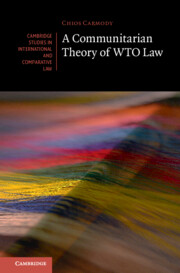Book contents
- A Communitarian Theory of WTO Law
- Cambridge Studies in International and Comparative Law: 181
- A Communitarian Theory of WTO Law
- Copyright page
- Dedication
- Epigraph
- Contents
- Figures
- Preface
- Acknowledgments
- 1 A Theory of WTO Law
- 2 The WTO Agreement as Community
- 3 The WTO Agreement and Justice
- 4 The WTO Agreement as a Law of Obligations
- 5 The WTO Agreement as a Law of Rights
- 6 The WTO Agreement as a Sui Generis Legal System
- 7 A Communitarian Theory and International Investment Law
- 8 Some Concluding Thoughts
- Bibliography
- Index
- Cambridge Studies in International and Comparative Law
2 - The WTO Agreement as Community
Published online by Cambridge University Press: 14 December 2023
- A Communitarian Theory of WTO Law
- Cambridge Studies in International and Comparative Law: 181
- A Communitarian Theory of WTO Law
- Copyright page
- Dedication
- Epigraph
- Contents
- Figures
- Preface
- Acknowledgments
- 1 A Theory of WTO Law
- 2 The WTO Agreement as Community
- 3 The WTO Agreement and Justice
- 4 The WTO Agreement as a Law of Obligations
- 5 The WTO Agreement as a Law of Rights
- 6 The WTO Agreement as a Sui Generis Legal System
- 7 A Communitarian Theory and International Investment Law
- 8 Some Concluding Thoughts
- Bibliography
- Index
- Cambridge Studies in International and Comparative Law
Summary
The theory of law put forward in this book is founded on the idea of interdependence. Interdependence generates goods taking the form of a community. In law a community involves common legal obligations pertaining to goods. The WTO Agreement establishes a “club good.” Its essence is the equality of opportunity for economic operators in members’ markets. These legal arrangements have given rise to enormous networks of global supply and value chains. At the same time, however, they have generated unease at de-industrialization and exposed critical vulnerabilities. Whereas at the time of the WTO’s founding in 1995 the unconditional interdependence called for in the WTO Agreement might have been regarded as beneficial, today it is seen as less so. Consequently, the club good of the organization appears to be splintering into individual goods composed of specific trading relationships. Consequently, support for the organization and its dispute settlement system has ebbed. Nevertheless, there appears to be recognition of residual worth in the WTO Agreement and its dispute settlement system, which may continue to serve as a locus for transformative solutions.
Keywords
- Type
- Chapter
- Information
- A Communitarian Theory of WTO Law , pp. 55 - 107Publisher: Cambridge University PressPrint publication year: 2023



